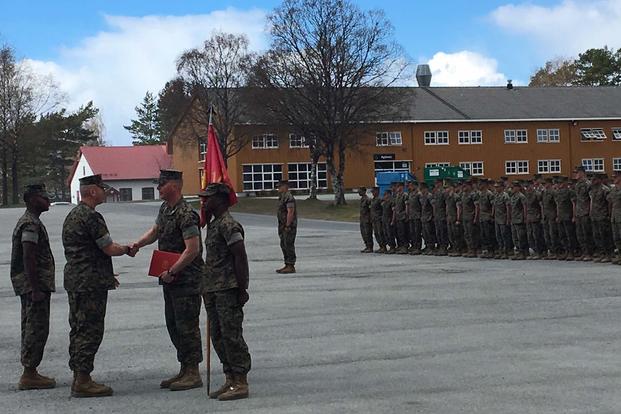VAERNES GARRISON, Norway -- In addition to the occasional case of fingertip frostbite, Marines on a six-month rotational deployment here will return with authorization to wear the ice-blue Navy Arctic Service Ribbon, a testament to long days and nights spent learning to fight in the cold.
Nearly 300 Marines deployed in January to this small Norwegian base near the city of Trondheim, part of a newly created element known as Marine Rotational Force-Europe. In collaboration with the Norwegian Ministry of Defence, the unit arrived with the joint goals of improving collaboration with European allies amid rising regional and global tensions, and improving the Corps' ability to move and fight in the cold, a skill set that has taken a backseat to desert combat operations in recent years.
Shortly after the Marines arrived, they traveled above the Arctic Circle for three weeks of intensive cold-weather training. In March, they traveled to Porsangermoen, just 100 miles from the top of the continent, to participate in the British-led exercise Joint Viking.
Marines who were part of the training and subsequent exercise said they learned how to dry sweat-dampened clothes using their own body heat; how to consume every ounce of energy from a slaughtered reindeer by drinking its red blood, as well as its meat; and the agonizingly slow process of melting and boiling snow to prepare freeze-dried food.
It was snowing intermittently Tuesday, the mercury hovering just above freezing, as Marines stood at attention, the sleeves of their green camouflage utilities rolled up in keeping with the regional commander's order. The commander of Marine Corps Forces Command, Lt. Gen. John Wissler, ordered them at ease and congratulated them on earning the ribbon.
"There's a lot of ribbons you don't have to do s--- to get," said Wissler, who was at Vaernes to attend a commanders' conference with other general officers. "This ain't one of them."
Wissler exhorted the Marines to pass what they'd learned on to other troops so that the Corps as a whole would benefit from their extreme-weather experience.
"As a Marine Corps, we've been very used to operating in sort of jungle and desert environments, but we're not as good at operating in Arctic environments as we need to be," he said. "This company of Marines, and those Marines that accompanied you in your training, are capable of engaging and locating, closing with and destroying by fire and maneuver any enemy that we would encounter in an Arctic environment. So my heartiest congratulations to you."
About 200 Marines, including much of the rotational force's infantry element, Bravo Company, 1st Battalion, 2nd Marines, earned the ribbon. To qualify for the award, a sailor or Marine must spend 28 days training or operating above the Arctic Circle over the course of a career. While the time spent in the Arctic can be nonconsecutive, Marines have rarely had the opportunity to earn the ribbon in a single deployment.
While Marines traditionally participate in the biennial Exercise Cold Response in Norway, that exercise extends only two weeks and would not alone qualify them for the award.
Marines with 3rd Platoon, Bravo Company, who spoke with Military.com estimated they have spent between six weeks and two months above the Arctic circle in just the first half of their Norway deployment.
Cpl. Anthony Selvitella, 22, said the unit's time in the Arctic had highlighted just how unfamiliar the Camp Lejeune, North Carolina-based Marines were with the demands of cold-weather operations. It demonstrated, he said, the need to develop more comprehensive preparatory training stateside for troops before they deploy.
But he was gratified, he said, to see the accomplishment of the unit honored by Wissler in the brief ceremony.
"It was a good experience for the company as a whole," he said. "Everybody wasn't really expecting it to happen. We thought [the award] was just going to show up on our [Marine Online account] and be there; we weren't expecting an actual ceremony."
Fellow platoon-mate Lance Cpl. Cal Cushing-Hurley, 20, displayed a darkened burn scar on his hand, where he had spilled boiled snow during cold-weather training. He said he was proud to wear the ribbon.
"Not many Marines have it, and not many Marines will have it," he said. "It's good to say I was able to accomplish the task."
-- Hope Hodge Seck can be reached at hope.seck@military.com. Follow her on Twitter at@HopeSeck.




























